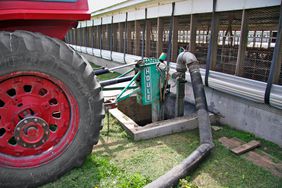:max_bytes(150000):strip_icc()/17272_219A9009-2000-00a25af2898b4ade9b8add3b8f1ac282.jpg)
Farm stress is high as uncertainty is higher than ever. When tension is high it can be easy to fall into unhealthy patterns.
However, when farmers are healthy, their farms may be more productive, explains psychologist and farmer Michael Rosmann. He cites a Swedish study that asked farmers about their behavioral wellbeing and compared it with veterinary calls and production data of their livestock.
"People who estimated their behavioral wellbeing as not very functional and as feeling distressed had higher rates of veterinary visits to their dairies or cattle feedlots," says Rosmann. "When their behavioral welfare improved, the number of veterinary visits dropped, the somatic cell count in the milk dropped, and it established a fairly clear link that the behavioral wellbeing of the herd is connected to how well famers are functioning."
Here are nine tips for coping with the stress farms and ranches around the country are experiencing.
1. Have a family and business plan for emergencies.
Gather your team of family members and employees to develop a crisis plan. Take time to gather input from each person. Organize emergency contacts in a place that is accessible to everyone. Determine emergency child and animal care plans.
2. Work on getting good sleep.
It can be difficult to sleep well during stressful times, but sufficient rest is key to staying healthy. According to the American Academy of Sleep Medicine, most adults need seven to eight hours of sleep each night.
- READ MORE: The dangers of sleep deprivation
"The physical manifestations of sleep deprivation are similar to what happens we have 0.08 concentration of alcohol in our bloodstream," Rossman says. Lack of sleep can slow your reaction time, increase the likelihood of mistakes, and cause you to take more risks.
When you head to bed, turn off all the lights and sounds. Falling asleep with a TV on or scrolling your phone can be disruptive to your body's natural sleep cycle. Create a cool and comfortable environment to help your body relax quickly.
"Our body slows down faster during sleep when it's cool," says Rossman.
If you do wake in the night, don't let yourself get worked up. Get comfortable and go back to sleep right away.
3. Build your external support team.
We all need help sometimes. Be aware of the skillsets of the people involved in your farming operation. For things your team is not equipped to tackle, enlist the help of external experts. This may include a farm management professional, extension specialist, or agronomist. These are people you are able to communicate with regularly and feel comfortable reaching out to in person, by phone, or email.
Your external support team doesn't have to be limited to ag experts. Mental health professionals and religious leaders can be very valuable members of your support team, too.
4. Keep communication lines open.
Although social distancing is limiting many in person meetings right now, reach out to friends, family, and neighbors. Phone, email, or video calls such as Skype or Zoom are all great options for staying in touch with your team and loved ones. Be honest about your struggles and be willing to listen to others' concerns.
5. Look for how you can help others.
Helping others makes you feel useful and can give you a sense of purpose.
- LISTEN: Helping a stressed-out neighbor
6. Watch your diet.
Stress eating can be tempting in times like this. A balance of fruits, vegetables, and proteins will help your body and mind stay healthy.
7. Limit alcohol and drug use.
Watch your intake of alcohol or other drugs, and seek the help of a doctor or mental health professional rather than using these substances to treat anxiety or depression. There are a number of resources for farmers feeling overwhelmed or hopeless.
8. Take a time out.
Take a short time each day to engage in prayer, meditation, or physical exercise for your mental, physical, and spiritual health. Even 10 or 15 minutes can help you feel refreshed and ready to focus again.
9. Keep each other accountable.
Talk with friends and family regularly to hold each other accountable to healthy habits. Don't be afraid to ask, "Are you sleeping alright?" or "Have you eaten today?"
:max_bytes(150000):strip_icc()/NatalinaBausch-6-06b14ffcaa32491e802c91c09e7fc867.jpg)







